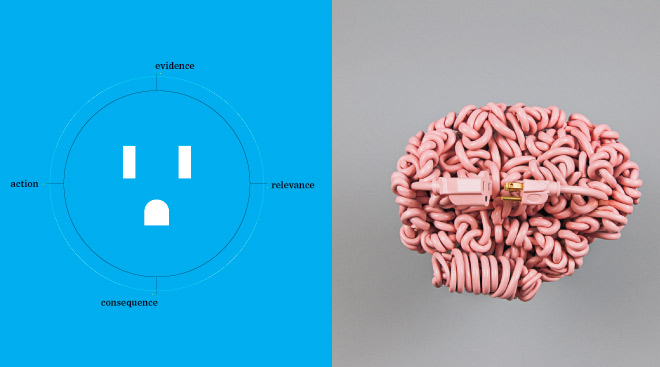
It’s pretty common here at Mockingbird to find a sympathetic review of recent findings from the worlds of sociology and psychology. There’s often a lot to like as these fields frequently help to illuminate somewhat obtuse theological concepts like the problem of the law and the bound will. But this compatibility between theology and the social sciences is self-selected, meaning there’s a great deal out there that isn’t worth reading. A recent article on Wired by Thomas Goetz highlighting the value of immediate feedback is a prime example of this latter category. It’s a well argued article and the data is incontrovertible – it can’t simply be dismissed – but its conclusions are in desperate need of modification.
The article observes that people who are simply reminded of their shortcomings will usually correct their conduct. This feedback serves to assess the individual’s performance, then compares this performance with the expected norm, while implying the downside and consequences of their actions. Faced with the facts, people will alter their lives accordingly. Evidence, Relevance, Consequence, Action.
The article finds that this “feedback loop” changes people’s destructive behaviors by an estimated 10%. They will eat better, conserve more energy, drive slower, sleep more soundly, – studies have found 10% improvement in each of these areas through the use of consistent feedback. Goetz suggests that this incremental change gives considerable results.
Evidence, Relevance, Consequence, Action: this process taps into something the article believes to be an essential quality of humanity: our ability to adapt to thrive in a variety of conditions. Goetz says:
“Evolution itself, after all, is a feedback loop, albeit one so elongated as to be imperceptible by an individual. Feedback loops are how we learn, whether we call it trial and error or course correction. In so many areas of life, we succeed when we have some sense of where we stand and some evaluation of our progress. Indeed, we tend to crave this sort of information; it’s something we viscerally want to know, good or bad.
I should first reiterate that they’re not making this data up. Feedback does offer mild improvement in behavior. But beyond this basic observation, the article seems to imply that feedback loops promise humanity a better tomorrow. 
While 10% improvement is nothing to sneeze at, is this sufficient? Is it enough to lie to your spouse 10% less, or is it enough to drive drunk10% less often? Sometimes incremental change is insignificant.
More fundamentally, Goetz’s article presumes an understanding of the individual which is implausibly rational. As David Brooks has pointed out (see also here), human actions are more complex than the a choice between predictable alternatives. Our very choices are marred by prejudices, whether its the perception of available choices, the overlooking of alternatives, or the weighing and evaluation of possibilities. Sometimes life doesn’t present any choice at all. Most problematically, there are forces at work within all of us (read: sin) that frustrate our desires and choices in a way that a feedback loop can’t help. As Paul says in Romans “I see in my members another law waging war against the law of my mind and making me captive to the law of sin that dwells in my members.”
Most of all, do I really want to live a life that depends upon incessant feedback to squeeze out only a 10% improvement of character and well-being? What kind of life is it to always have to be reminded to do what is best for me? Should I have to always be reminded to compliment my spouse or not waste time at work?
This leads me to ask: are feedback loops really our only hope? If theology fits anywhere in Goetz’s article it is here, in its failure to deliver what it promises. By seeing the dead-end of a promise that depends upon our own efforts to bring about its realization, we can more fully see the wonder of a God who has promised through his son to unilaterally rid ourselves and the world of the corruption of sin. God is not a feedback loop of incremental change, but the one who calls into existence the things that do not exist.

COMMENTS
3 responses to “Need Self-Improvement? Just Read the Signs!”
Leave a Reply














WE MUST DIE AND BE BORN AGAIN INTO A NEW LIFE
Good thoughts, Todd, and I don’t necessarily disagree. However, I see another angle at work here also: The overwhelming majority of “changes” that are wrought in our lives — through the Word of God, the Spirit of God, interaction in the community of faith, etc — happen slowly, almost imperceptibly. When I gave my life to Christ, my language cleaned up instantaneously. But there are a thousand other dark spots on my soul that only faded over time and with exposure to the Light. Besides, doesn’t it stand to reason that if there is such a thing as a feedback loop (other than as a concept), that it was created by God as one more way of working in our lives? Just a thought…
Hey Eric, thanks for the thoughts and feedback (pun intended). What you have to say about the Word of God through the Spirit, as well as the community of faith are elaborations of what I refer to when I talk about the God who calls into existence the things which do not exist. But whether God uses feedback loops as part of this process I’m less inclined to agree with you – mostly because feedback loops seem like a far, far cry from what St. Paul’s description of love.